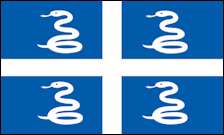Martinique - Climate
 Martinique enjoys a tropical climate tempered by maritime influences and trade winds. Thanks to an average temperature of 79°, Martinique is the island of the “never-ending summer.” Trade winds from the east and northeast provide a steady breeze that constantly refreshes the air. Due to these tropical climate conditions in Martinique, the island is lush with vegetation: lavish tropical forests, groves, savannas, countless species of trees, fruits, plants and flowers, not to mention the mangrove forests.
Martinique enjoys a tropical climate tempered by maritime influences and trade winds. Thanks to an average temperature of 79°, Martinique is the island of the “never-ending summer.” Trade winds from the east and northeast provide a steady breeze that constantly refreshes the air. Due to these tropical climate conditions in Martinique, the island is lush with vegetation: lavish tropical forests, groves, savannas, countless species of trees, fruits, plants and flowers, not to mention the mangrove forests.
Two seasons succeed each other: Lent, dry season from January to June, and winter, wet season from July to December. The average temperature is 25°C. Intermittent rainfall concentrated on September and October. Average sea water temperature: 24 to 28°C. Martinique is covered by a lush tropical forest and has many mangroves, marshes with rich vegetation that occupy the shallow coastlines of the tropical territories.
A 2008 IUCN report, Climate Change and Biodiversity in the European Union Overseas Entities (Petit J. & Prudent G.) assessed the impact of climate change on biodiversity in the European Union Overseas Entities, including Martinique. The report highlighted risks from climate change impacts including: risk of damage to mangrove habitats due to a potential increase in the intensity of tropical storms and rising sea levels; and expected temperature variations – including an increase in average temperatures – which could threaten high-altitude forests in Martinican massifs.
Although there is relatively little research into the future impacts of climate change on Martinique, some assumptions can be made. For example, given proximity and common characteristics of Martinique and Guadeloupe, it is reasonable to assume that the likelihood and magnitude of climate change impacts will be similar in these two territories. On this basis, changes in climate are expected to include: an increase in average temperatures and the occurrence of periods of very hot weather; an increased variation in the occurrence of both the hurricane and thunderstorm season, as has already been observed on Martinique; and an increase in the frequency of summer droughts.
The French National Plan for adaptation to climate change (2011-2015) carried out a consultation with the Outermost Regions, including Martinique, during its development to ensure that the recommendations developed correctly addressed the challenges faced by Outermost Regions. Most of the national recommendations did correctly apply to the Outermost Regions. Some recommendations require adjusting to the local context during implementation however. In addition, nine complementary recommendations were developed to consider the specific needs of the French Outermost Regions.
Martinique adopted its Regional Plan for Climate, Air and Energy (SRCAE Martinique 2012), which provided an overview of the contribution of Martinique to climate change, and the impacts of climate change to Martinique. The SRCAE also defined a strategy to address the challenges presented by climate change.
Martinique is addressing the climate issue by aggressively implementing the Climate, Air and Energy Master Plan developed in cooperation with the French Government. In order to promote a more circular economy that consumes less non-renewable resources, the Regional Council of Martinique has also decided to go beyond the Master Plan with a program called “Martinique – Sustainable Island.” The goal is to achieve a 100% renewable energy mix by 2030.
On May 9, 2015, the French Caribbean island of Martinique hosted the regional summit, Caribbean Climate 2015, which was chaired by French President François Hollande. The summit gathered over 40 heads of state, governments and Caribbean organizations to discuss the impact of climate change on the island nations of the Caribbean. French Minister of Foreign Affairs and International Development, Laurent Fabius, was also attending.
Organized by the Regional Council of Martinique, presided by Serge Letchimy, the summit goal was to give a voice to Caribbean nations on climate change through a joint statement to be heard at COP 21*, which will be held in Paris from November 30 to December 15, 2015.
|
NEWSLETTER
|
| Join the GlobalSecurity.org mailing list |
|
|
|

